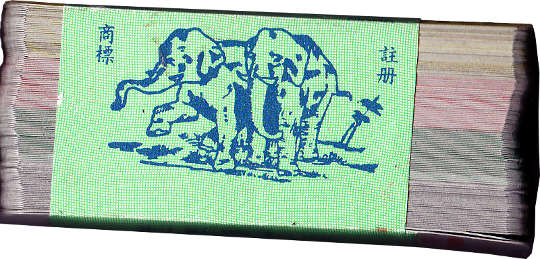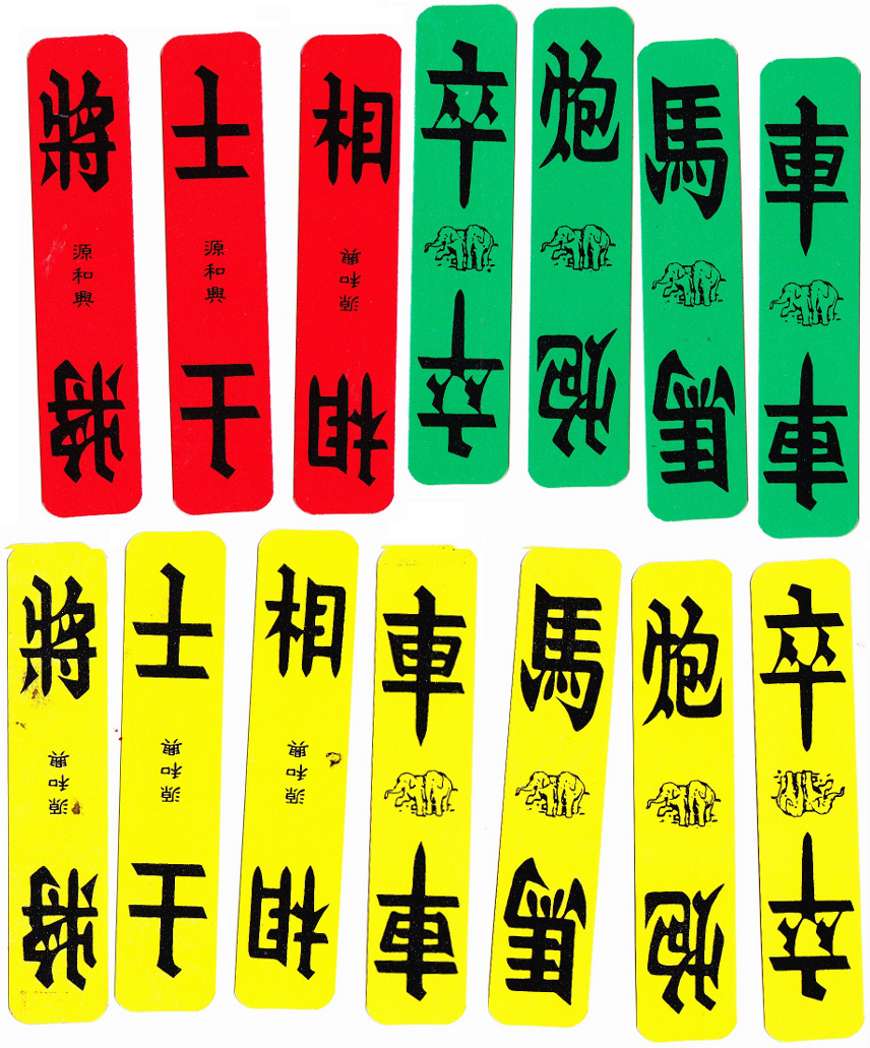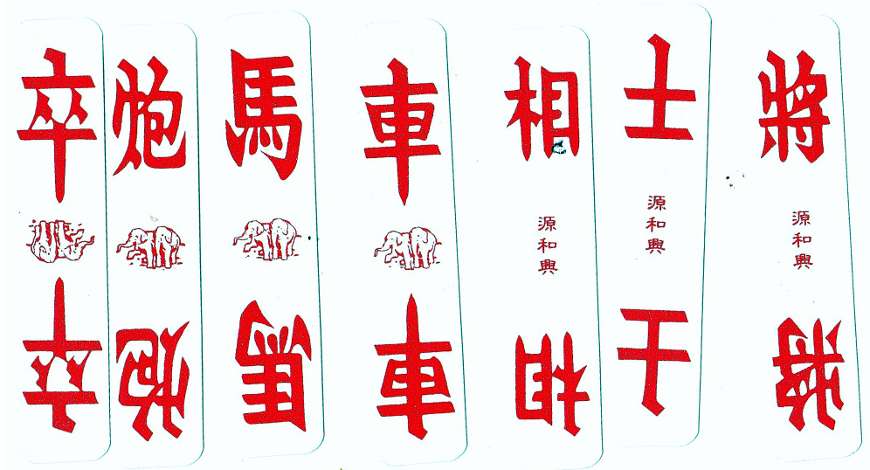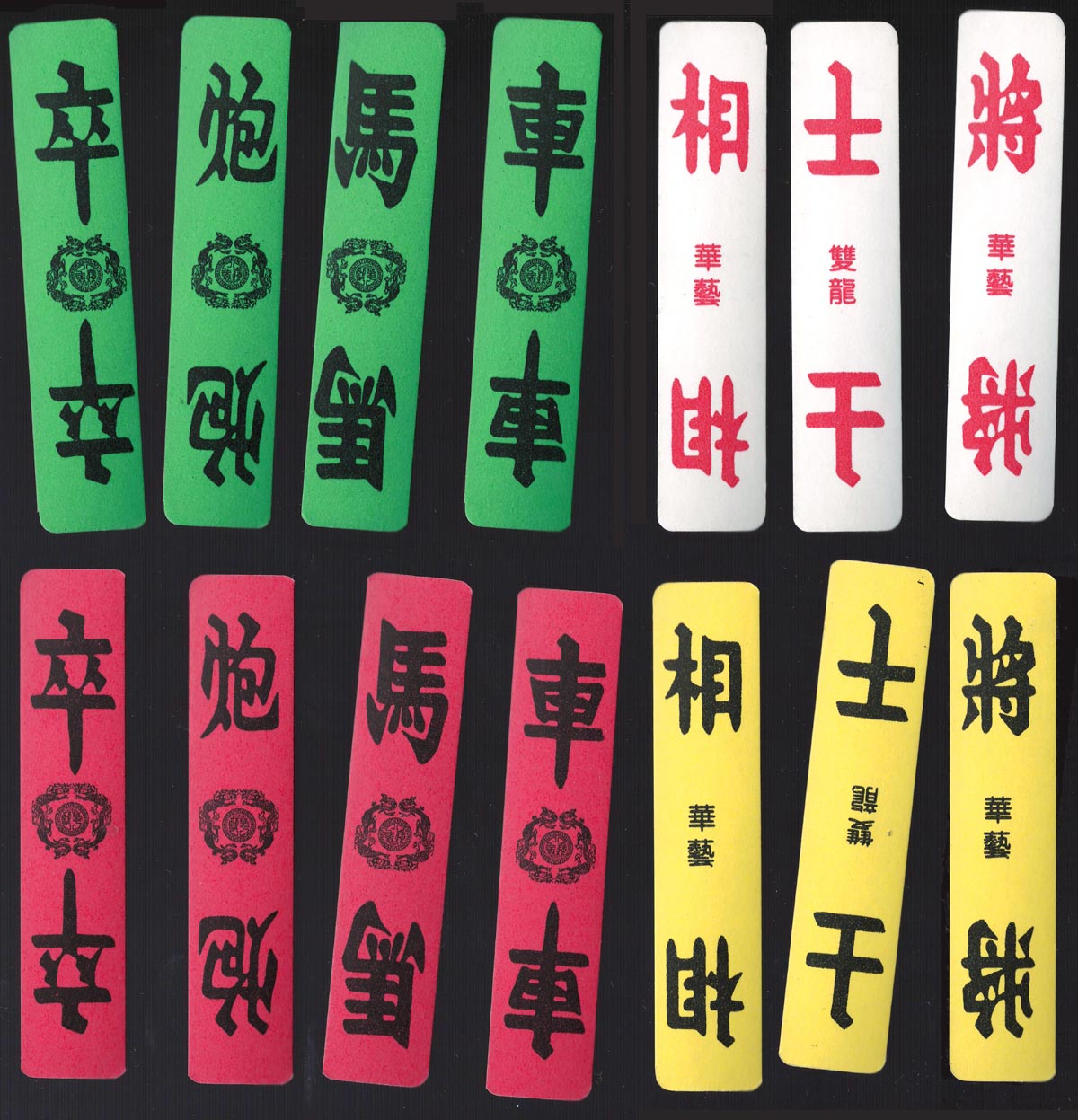Double Elephant & Double Dragon
Double Elephant brand Four Colour cards
Double Elephant brand Four Colour cards

“Double Elephant” brand is the registered trade mark of Yuan Ho Xing, the name of the manufacturing company, which translates as “origin of happiness.” Although the cards are used in Singapore, they appear to be printed in Hong Kong. According to my great aunt (an expert on these matters) there used to be yet another sort of four-colour-cards, which were shorter and squatter than the ones I show you, and had ochre-red backs.


Above: ‘Double Elephant’ brand ‘Four Colour cards.’ The ranks are : 將- general, 士-advisor or valet, 相- elephant, * 車- chariot, 馬-horse or knight, 炮- cannon, 卒- soldier. * the character 相 taken literally means 'like.' Some sources translate this as 'minister.' By right, the character for elephant should be 象. The reason for this strange substitiution is that both characters sound much the same. Images kindly supplied by Anthony Lee of Singapore.
“Double Dragon” Four-Colour cards by Hua Goi (華藝) Pte Ltd
As in the above deck, with the brand name “Double”, the Chinese reckon twos, and even numbers in general as lucky.

Above: “Double Dragon” four-colour cards by Hua Goi (華藝) Pte Ltd. These cards are are of the same pattern as those produced by the "Double Elephant" brand. The Chinese call these the "Chaozhou four-colour cards" 潮州四色牌 . Both decks possess the same basic structure. There are four colours or suits. In each suit there are seven ranks, 将, 士, 相,車, 马 ,炮,& 卒. This basic unit of 28 cards is quadrupled, giving the full deck of 112 cards used for the game.
In addition to ordinary 112 card decks, Hua Goi produced some decks with an extra five cards. These five cards are the "Jokers". These jokers are much plainer than the ones featured here or here. Instead of displaying the ranks of the Chinese nobility, they merely display the company's double dragon logo, and the legend 華藝雙龍 -- Hua Goi Double dragon [playing cards] Still, there is a pleasing simplicity about these designs,
In the ranks of 将, 士, 相, the maker has placed two inscriptions in the middle of the cards: First, "華藝" ( the company name, literally meaning "Honour"), and second 雙龍 ("Double Dragon" , the name of this particular line of decks). On the ranks of 車, 马 ,炮,and 卒., the eponymous double dragons make their appearance. This distinction between the central decoration reflects the way in which this game is played. It may also be seen in the "Double elephant" deck. These cards were considerably cheaper than the ones produced by the “Double Elephant” brand, partially due to their local manufacture. Alas, they are now no more.

Related Articles

Danao Tiāngōng Puke
Children’s playing cards based on the 1961 Chinese animated feature film 大闹天宫 (Havoc in Heaven).

More Menthol Filter Cigarettes
Elongated cards with designs by Wong Yui Man advertising More cigarettes.

QAIPES – cartas españolas
Spanish-suited cards made in China inscribed “QAIPES” and “BAIPES”!

Quên Tarot
A mystical voyage of love and self-discovery created by Duy Khánh Võ.

Calon Arang • Калон Аранг - Бали
Calon Arang, a figure from 12th-century Javanese and Balinese folklore known as a witch skilled in b...

Back to the 80s Lenormand
History meets pop culture in a 36-card set that pays tribute to Lenormand's legacy and the colourful...

Pixel Tarot
This tarot deck pays tribute to the golden age of pixelated video games, drawing inspiration from th...

Joseph Bardou & Fils cigarette papers
Delightful pack advertising Joseph Bardou & Fils cigarette papers for the Philippines.

Fried Chicken Playing Cards
This innovative chicken-themed concept combines playing cards with the aroma of fried chicken.

Souvenir of Singapore, Malaya and Borneo
52 different colour pictures of Singapore, Malaya and Borneo from the early 1960s.

Chinese Opera Masks Playing Cards 脸谱
Three different packs of cards featuring traditional Chinese face painting and Chinese opera masks.

TikTok Tarot
TikTok Tarot is a unique tarot deck that puts a modern spin on the Rider-Waite format; with TikTok-i...

Chinese Money-Suited Playing Cards from the British Museum
This deck of Chinese playing cards, donated to the British Museum in 1896, is believed to have been ...

Acelion Cyberpunk Playing Cards
This cyberpunk deck by Acelion combines magic and science fiction elements, inspired by Nordic mytho...

SilkAir
SilkAir was a Singaporean regional airline and a wholly owned subsidiary of Singapore Airlines.

Singapore Trump
“Singapore Trump” playing cards designed by Yasuko Senshu.
Most Popular
Our top articles from the past 28 days

